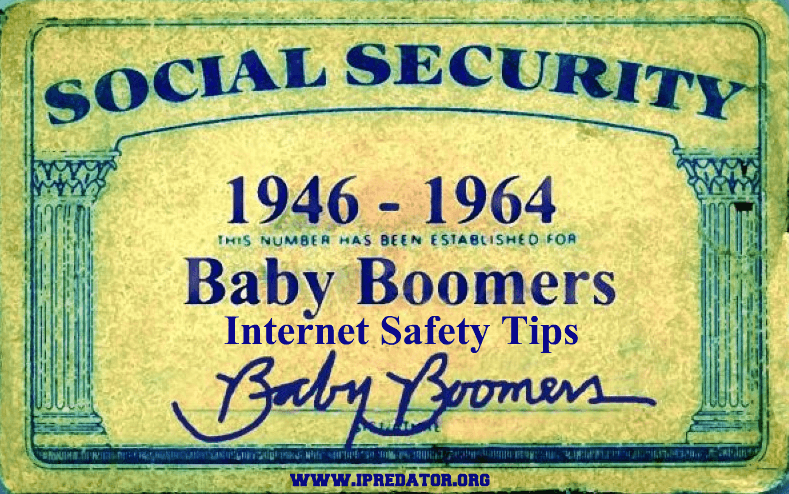30 Baby Boomer Internet Safety Tips
Internet safety and cyber-attack prevention are areas rapidly becoming mandatory skill sets for all online users living at the beginning of what is called the Information Age. Although the internet is young, the nefarious and malevolent elements seeking to victimize the innocent are avid enthusiasts. The online populations they often target are children, older adults and those characterized as discouraged, distressed, unaware or internet safety ignorant. Provided below are 30 Baby Boomer internet safety tips for older adults and senior citizens.
Information and Communications Technology (ICT) offers many wonderful benefits to Americans of all ages and from all levels of society, but it is paramount to identify, prevent and thwart the malevolent and nefarious entities that seek to harm those deemed vulnerable. Michael Nuccitelli Psy.D., a New York State licensed psychologist, forensic psychology consultant and author of the Information Age Forensics construct, iPredator, is available at no cost, to provide internet safety and social media safety strategies specific to Baby Boomers and older adults.
In addition to being skilled at discussing cyberbullying, cyber harassment, cyberstalking, cybercrime, online sexual predation and adolescent internet culture, Dr. Nuccitelli is also adept at teaching older folks effective internet safety strategies. Not only have Baby Boomers spent less time connected to information technology than their younger peers have, but their years of pre-Information Age beliefs in a sense of community and charity have made them particularly vulnerable. Despite their vulnerability, Boomers are more internet safety savvy than Millennials.
Increasing the Baby Boomer’s victimization potential is having greater financial latitude, fewer interpersonal and intimate relationships and more time spent alone with only the internet to provide them social, intellectual and psychological stimulation. Taking these factors into account, Dr. Nuccitelli has compiled Baby Boomer internet safety concepts and tips specific to their developmental challenges. For the older adult online user, cyber-attack prevention and internet safety closely mirror the tactics recommended for all online users but vary slightly in approach and focus.
As stated by Dr. Nuccitelli, “The Baby Boomers of the past fought for social, economic and political equality for the disadvantaged. Unfortunately, the Information Age is undoing these accomplishments by creating a sociological and psychological disconnected generation eerily similar to what they fought so hard to change.”
Boomers Born 1946-1964
The Baby Boomer Generation is defined as American men and women born between the years of 1946 and 1964. From a population standpoint, during these years roughly 75 million babies blessed the United States making up 40% of the total population. Given this tremendous societal feat of mass procreation, America seemed to be filled with confidence and optimism with prosperity for all being an inevitable outcome.
As Baby Boomers grew older, many of them began to fight for economic, political, social, economic and equal justice for the disadvantaged. Just as previous periods in history, Baby Boomers have walked through life witnessing some of history’s greatest events, accomplishments and tragedies.
Some of these include the Cuban Missile Crisis, Vietnam War, Civil Rights, massive social change and the space program were just a few of the events they witnessed. Although technology, civil unrest and societal upheaval were commonplace during their young years, the Baby Boomers were never confronted, until recently, with a massive societal paradigm shift as children experience today in our rapidly expanding techno-centric world called the Information Age.
The Information Age is a societal paradigm and period beginning in the last quarter of the 20th century and presently thriving. The Information Age is a stage in societal and technological development similar to the Industrial Revolution (1750-1942). The Information Age represents the evolution, emergence, consumption of and reliance upon Information and Communications Technology (ICT).
In a brief period of time, ICT and its importance to humanity have led many to surmise that the planet and its human inhabitants are amidst an Information Revolution. Mobile digital technology, telecommunications, social media and the abstract concept and artificial universe of cyberspace are just a few examples of humanities newest frontiers to obtain, exchange and disseminate information. The planet is experiencing a shift from traditional industry, born and bred during the Industrial Revolution, to an economy based on the creative and rapid manipulation of information.
The importance of ICT to humanity lies upon a continuum of relevance ranging from minimal impact to vital requirement regarding an ICT users day to day activities. For some, ICT and the Internet are nothing more than tools of convenience for conducting their responsibilities. For others, their social, scholastic, business and/or financial affairs disclosed in cyberspace and through ICT are crucial to their self-esteem, self-worth, success and perceptual world.
ICT has changed the way humanity interacts, exchanges and accesses information. Smartphones, mobile devices and social media are the latest in a succession of advancements growing at a feverish pace. Prior to ICT, all methods of communication involved some form of identification and response recognition skills using at least one of the five senses. Although deception, crime and immoral acts were committed, they entailed far more creativity, design and planning than what is required using ICT and cyberspace.
In cyberspace, our physical senses are subdued as we exchange and/or verify information as valid in isolation from the source. The “veil of anonymity” afforded to anyone using ICT offers numerous benefits, but the detriments can far outweigh the assistances for the vulnerable or high-risk target. Although the recipient of information in cyberspace can use their senses of sight and hearing, it is still impossible to rely on that information to verify the identity of the sender or his/her intent behind the information. Without having access to the five senses or being able to accurately determine the identity, motivations or location of the sender, a human’s natural tools used in self-preservation and protection are significantly hampered. It is for these reasons why the Information Age has introduced to humanity what this writer has termed iPredator.
INTERNET SAFETY TIPS
1. Regularly verify that your email addresses, social profile usernames and all links to personal homepages cannot be connected to your home address or exact identity.
2. Make it a habit to verify that you do not announce your physical location via status updates on GPS-enabled mobile device applications
3. Make it a habit to never leave a logged in computer unattended for extended periods.
4. Schedule time monthly and check what new identity theft risks and internet fraud scams are being spread online.
5. Never disclose your financial information online unless you are 110% positive the person, store, office or organization is the one requesting it.
6. Always be skeptical if anyone asks for money online no matter how sure you are the person, office, organization or charity is genuine or the organization is reputable.
7. Make it a habit to verify that your online images and videos do not have hints to where you live or places of entry within your residence.
8. Regularly verify that you do not have a mobile device or phone containing information that is embarrassing and/or sensitive.
9. Regularly remind yourself that images and videos you post online can remain in cyberspace for years.
10. Regularly remind yourself that sensitive and/or sexual information you share online may be impossible to delete.
11. Regularly remind yourself that “sexting” involving you or friends can be shared with others without your consent.
12. Regularly remind yourself to never have sexual conversations with someone you met online.
13. Make it a habit to verify that you review the privacy and security settings at social media sites (i.e. Facebook, Linked In) you have joined.
14. Make it a habit to never call, text message or chat online with strangers.
15. Make it a habit to never communicate with online strangers discussing sexual topics.
16. Make it a habit to never engage in online activities you do not want a loved one to know about.
17. Make sure to never meet in person someone you met online without a loved one’s support and/or knowledge.
18. Make it a habit to keep up with news on smartphone and mobile device security vulnerabilities.
19. Make it a habit to use multifactor authentication to access networks.
20. Make it a habit to verify that you wipe data off your electronic devices before you dispose of them.
21. Make it a habit to securely back up your mobile devices on a regular basis.
22. Make it a habit to shut off your computer(s) and mobile devices when not using them.
23. Monitor your credit statements monthly for any fraudulent activity from online transactions.
24. Make it a habit to verify that you regularly check for new cybercrime protection products and services.
25. Make it a habit to have passwords with more than five characters and have different passwords for different accounts.
26. Make it a habit to confirm that you turn off wireless devices when they are not being used.
27. Regularly check to confirm your computer and/or mobile devices are current with the latest security patches and updates.
28. Make it a habit to verify that you always look for the “locked” icon at e-commerce and online shopping sites.
29. Make it a habit to verify that your computer(s) and mobile devices are configured securely.
30. Never open email attachments from unknown senders and never respond to email messages that ask for financial information.

Michael Nuccitelli, Psy.D.
Michael Nuccitelli, Psy.D. is a NYS licensed psychologist, cyberpsychology researcher and online safety educator. In 2009, Dr. Nuccitelli finalized his dark side of cyberspace concept called iPredator. Since 2010, he has advised those seeking information about cyberbullying, cyberstalking, cybercriminal minds, internet addiction and his Dark Psychology concept. By day Dr. Nuccitelli is a practicing psychologist, clinical supervisor and owner of MN Psychological Services, PLLC. After work and on the weekends, he volunteers helping online users who have been cyber-attacked. Dr. Nuccitelli’s is always available to interested parties and the media at no cost. This website and everything created by Dr. Nuccitelli is educational, free and public domain.
